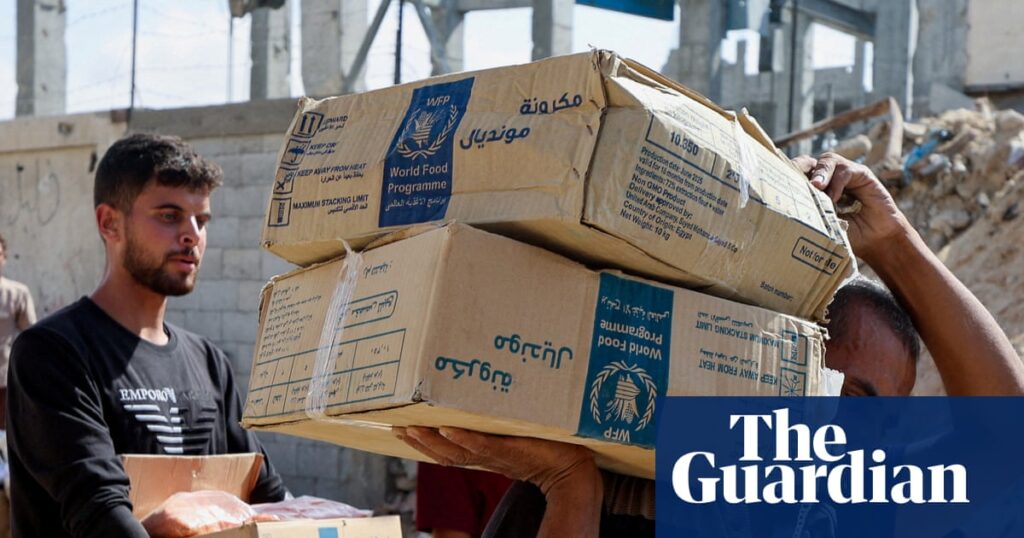Aid agencies are preparing to bring large amounts of vital aid to starving people in Gaza this weekend, as a ceasefire between Israel and the Palestinian militant group Hamas appeared to be holding.
“We have received signals that tomorrow will be the day that the scale-up [in aid deliveries] begins in earnest under the ceasefire,” said Tess Ingram, a spokesperson for the UN agency for children, Unicef.
“The stakes are really high,” said Ingram, speaking by phone from Gaza. “Even though we have a ceasefire – which means the bombardment stops – the humanitarian crisis continues. We still have a famine to fight and diseases are spreading, so we really need that scale-up to happen quickly and efficiently.”
Ingram said Unicef was calling for all crossings from Israel into Gaza to be reopened, so that trucks were able to move through quickly “without delays or impediments”.
Another UN aid agency, Unrwa, said it had enough stored food to feed every Palestinian in Gaza for three months. Its communications director, Juliette Touma, said on Saturday that the distribution of aid was “absolutely critical in controlling the spread of famine”.
Tens of thousands of tonnes of supplies are positioned in neighbouring countries such as Jordan and Egypt. Under the terms of the first phase of the deal, aid is meant to surge into Gaza, and humanitarian groups are preparing to send in about 600 truckloads of food and medical supplies a day.
During the war, Israel shut down entry and exit routes, largely blocking off food and medicine, which in turn caused a famine in large parts of Gaza.
Aid agencies are hoping Israel will now stick to Trump’s 20-point plan, which said the entry and distribution of aid in the Gaza Strip should “proceed without interference”.
On Saturday, the Italian defence minister said the Rafah crossing, a crucial movement point between Gaza and Egypt for aid trucks but also people, will reopen on Tuesday. Israel took control of the border post last year.
Rafah “will be opened alternately in two directions: exit towards Egypt and entry towards Gaza”, Guido Crosetto said.
With the UN returning to a lead role in humanitarian assistance, the Gaza Humanitarian Foundation, a US- and Israeli-backed private contractor scheme, appeared to be winding down. The programme was widely condemned as it forced people towards food distribution sites where they were shot in large numbers by the Israel Defense Forces (IDF). One UN official called it a “sadistic death trap”.
The truce is hoped to halt the famine, bring the release of hundreds of detained people and end daily Israeli bombings that often wiped out whole families. On Friday, tens of thousands of displaced Palestinians in Gaza began to return to the ruins of their homes after the Israeli troops withdrew to new, agreed-upon positions. According to Gaza’s civil defence agency, more than 500,000 people have returned to Gaza City since the ceasefire.
Trump’s Middle East envoy, Steve Witkoff, was in Gaza early Saturday to observe the Israeli military redeployment, Israeli Army Radio reported, citing a security source.
Still, there are concerns that the deal could break down unless pressure is kept up.
Previous ceasefires have failed, and an Israeli attack on Lebanon early on Saturday led to fears of fresh violence during a tense period. The pre-dawn airstrikes struck a building that sold construction vehicles and killed one person and wounded seven others, the Lebanese health ministry said.
Israel’s military claimed it had struck a place where machinery was stored to be used to rebuild infrastructure for the militant group Hezbollah.
The US-led agreement reached this week aims to end the current war in stages, delaying big issues such as the disarmament of Hamas and a clause that commits Israel to “not occupy” Gaza.
According to the agreement, Hamas is obliged to release all Israeli hostages from Gaza within 72 hours of the ceasefire starting, meaning Monday morning. Israel will free 250 Palestinians serving long sentences in its prisons and 1,700 other Palestinians captured during the war and held without charge.
Israel’s prison service said on Saturday it had begun transferring prisoners from several detention facilities to two jails ahead of their release.
A list published by the Israeli government’s official website on Friday excluded the names of several high-profile Palestinian prisoners, including the popular politician Marwan Barghouti.
Supporters of the 66-year-old say Israel fears his ability to force effective change and unify Palestinians, many of whom see him as a Nelson Mandela-style figure.
Mousa Abu Marzouk, a senior Hamas official, told the Al Jazeera TV network that the group insists on the release of Barghouti and other high-profile figures and that it was in discussions with mediators.

